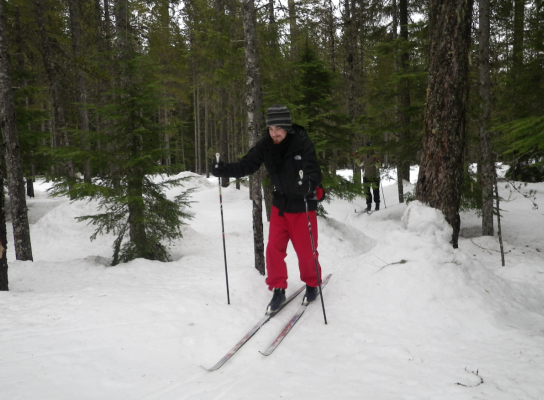Print Edition: March 13, 2013
Canadians, especially Canadians on the West Coast, have a unique gift: a beautiful rainforest landscape, habitat to many species aside from our own. British Columbians tend to be acutely aware of this fact, taking every opportunity to get outside and hike, ski, bike or just bask in the natural wonder. And despite having spent the majority of my 20-odd years living here, I have a startling confession to make.
In February, I went cross-country skiing for the very first time.
When the opportunity to partake in this Canadian rite of passage appeared kind of out-of-the-blue, there was no way I could pass it up. It seemed like not only a hell of a lot of fun to glide across endless tracks of packed snow, but also a great way to get back in touch with our province’s greatest feature.
Making our way to Chilliwack Lake, we travelled kilometre after kilometre of forest road supported on either side by green overgrowth. There was a low cloud shelf verging on fog that cloaked the tops of the trees and nearby hills in layers of billowing white. It was gorgeous and wild.
Interrupting this idyllic scene were swaths of trees ripped out of the land in strips, the fallen lumber scattered grotesquely like telephone poles across the barren ground. These patches looked more like the product of mudslides than any sort of human action.
It was shocking, but not altogether surprising. The lumber industry has been a major part of the BC economy for centuries and I can appreciate that. So don’t get me wrong, I’m not opposed to responsible logging practices, responsible being the operative word.
I was dismayed to discover that the BC Liberals had tagged on a provision, section 24 of their miscellaneous statute amendment bill 8, which would radically change the way in which BC’s forests are managed.
It would be largest reclassification of Crown forests to Tree Farm License status in BC history. The move would more or less privatize 25 million hectares of forests that are currently owned by the public.
This would enable forestry companies and corporations to begin logging in these areas without any public consultation or approval process. Section 24 proposes a fundamental shift in control of our province’s greatest resource that would prove difficult, if not impossible to overturn.
In an interview with The Vancouver Observer, retired BC Forest Service worker Anthony Britneff explained that if the public ever wanted to regain access to these lands again, they would be required to pay large sums of money to the corporations who would retain the rights.
The move is egregious, not only ecologically-irresponsible, but economically-irresponsible. What’s worse is that it’s not the first move of its kind, but part of an ongoing trend to treat natural resources as an ordinary commodity rather than a public treasure. The results will be similar to those of the omnibus bill which passed through the House of Commons will little fanfare.
Public outcry prevented a similar measure from passing BC legislature under the Social Credit party in 1989. Bill 8, currently in its second reading stage, is set to pass with little to no coverage in mainstream media. The only articles I was able to find on the subject appeared in The Tyee and The Vancouver Observer, not the Vancouver Sun or The Province.
Have British Columbians simply resigned to the fate of their forests or have their media and public officials failed them?
Looking out at the greenery all around me, it’s hard to believe that it could ever be the former.


